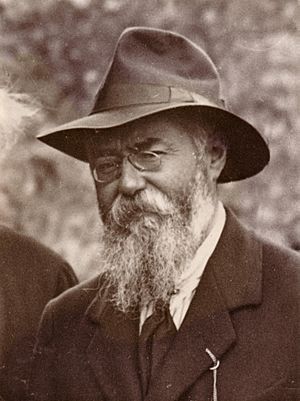Francis Jammes facts for kids
Quick facts for kids
Francis Jammes
|
|
|---|---|

Jammes in 1917
|
|
| Born | December 2, 1868 Tournay, Hautes-Pyrénées, France
|
| Died | November 1, 1938 (aged 69) Hasparren, Pyrénées-Atlantiques, France
|
| Occupation | Poet |
Francis Jammes (pronounced "Jahm") was a famous French poet. He was born on December 2, 1868, in Tournay, Hautes-Pyrénées, France. He passed away on November 1, 1938, in Hasparren, France.
Jammes spent most of his life in the beautiful countryside of Béarn and the Northern Basque Country. His poems are special because they are very lyrical. They often talk about the simple joys of country life, like donkeys and young women. Later in his life, his poetry also included strong religious themes. This happened after he became a practicing Catholic in 1905.
Contents
Life of Francis Jammes
Early Life and Education
Francis Jammes was not a great student when he was young. He even failed his final high school exam, called the baccalauréat, getting a zero in French! But he found his true calling in writing.
Becoming a Poet
Around 1895, people in Paris started reading his first poems. They liked his fresh style, which was different from the popular "symbolism" movement at the time. Symbolism was a style where artists used symbols to express ideas, often in a complex way. Jammes's poems felt more direct and natural.
In 1896, Jammes traveled to Algeria with another famous writer, André Gide. He also became friends with other important writers like Stéphane Mallarmé.
Famous Works and Religious Change
One of his most famous poetry collections was De l'angélus de l'aube à l'angélus du soir. This means "From morning Angelus to evening Angelus." It came out in 1897. Another popular book was Le Deuil des Primevères ("The Mourning of Primulas") in 1901.
Before this, Jammes worked as a clerk for a notary (a legal official). But after his books became popular, he could earn a living just from his writing.
In 1905, a poet named Paul Claudel became a close friend and influenced Jammes greatly. Because of this friendship, Jammes became a very religious Catholic. His later poems became more serious and sometimes focused on religious teachings.
Life in the Pyrenees
Many people in the Parisian literary world saw Francis Jammes as a quiet person who preferred to live in the Pyrenees mountains. His poems were never the most popular fashion in Paris. He tried several times to join the Académie française, a very important French council for arts and literature, but he was never chosen.
Influence on Music
Francis Jammes's words inspired many musicians.
- The famous French singer Georges Brassens used Jammes's poem Les Mystères douloureux ("The Agonies of Christ") for his song La Prière ("The Prayer"). Brassens changed some words to make it fit the music better.
- Thirteen of Jammes's poems from his Tristesses ("Sorrows") collection were set to music by the composer Lili Boulanger. This musical piece was called Clairières dans le ciel ("Clearings in the Sky") and was created in 1914.
Interests and Hobbies
Jammes loved outdoor activities, especially hunting. He was also known for caring about nature. He believed in protecting animals that were in danger of disappearing.
Selected Works
Francis Jammes wrote many poems and stories throughout his life. Here are a few examples of his well-known works:
Poetry Collections
- Vers (1892)
- La Naissance du poète ("The Birth of the Poet") (1897)
- Le Deuil des primevères ("The Mourning of Primulas") (1901)
- Clairières dans le ciel ("Clearings in the Sky") (1906)
- Les Géorgiques chrétiennes ("Christian Georgics") (1911–1912)
Prose Works (Stories and Essays)
- Clara d'Ellébeuse (1899)
- Le Roman du lièvre ("The Story of the Hare") (1903)
- Ma fille Bernadette ("My Daughter Bernadette") (1910)
- Le Bon Dieu chez les enfants ("The Good Lord with the Children") (1921)
Images for kids
See also
 In Spanish: Francis Jammes para niños
In Spanish: Francis Jammes para niños
 | Delilah Pierce |
 | Gordon Parks |
 | Augusta Savage |
 | Charles Ethan Porter |


